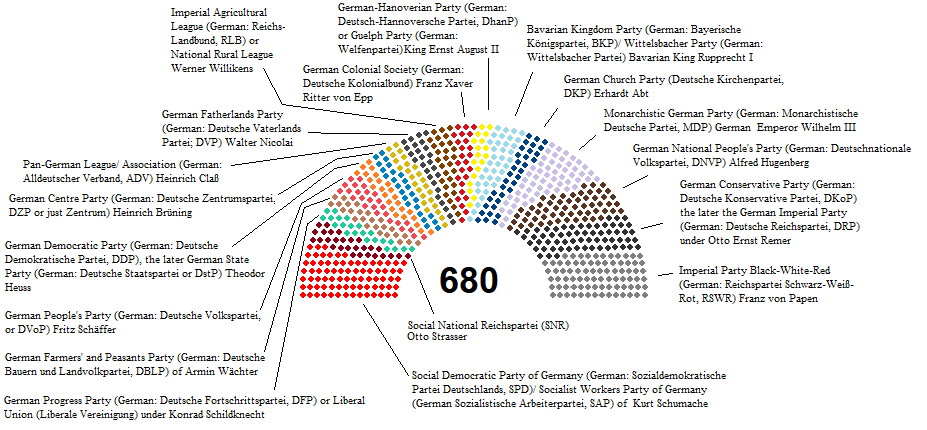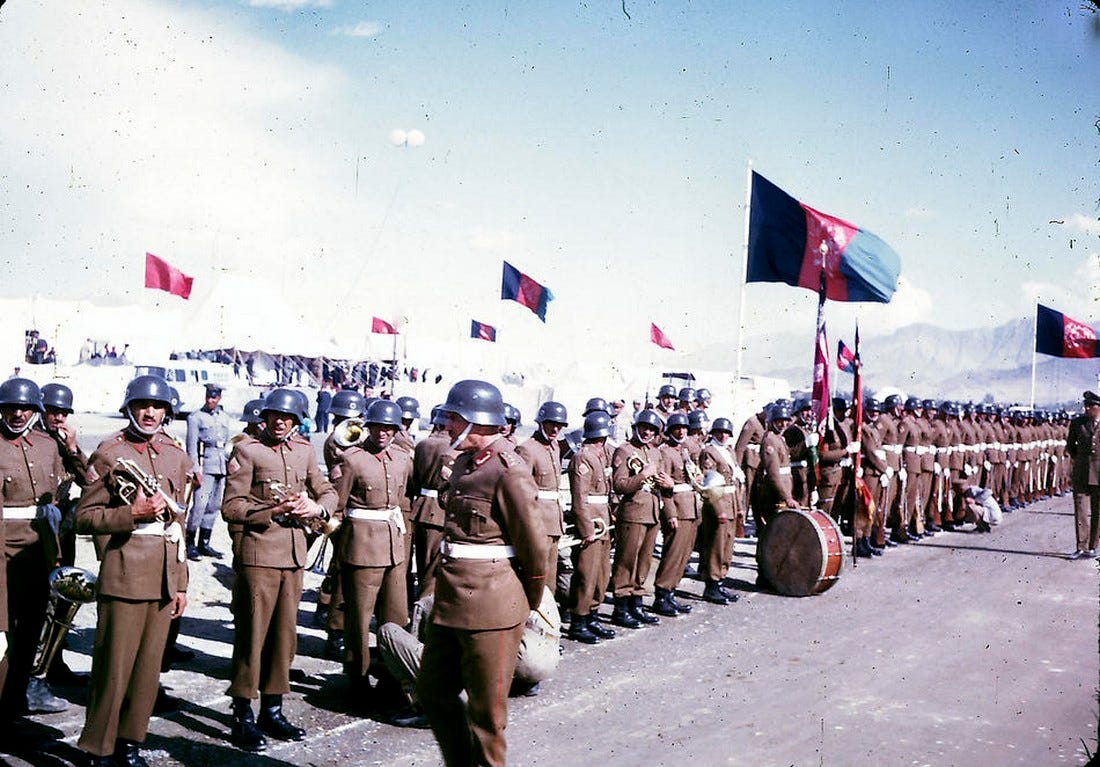Chapter 697: The Imperial German Election of 1942 - Part 2

The Imperial German Election of 1942 clearly showed the growing influence of National Monarchism and Fascist Royalism, as out of a population of 77,1 million voters (including the 71 Million from the Weimar Republic/ Nazu German rump state, 2,9 million from Switzerland, 1,7 million from reconquered French border territory and 1,5 million from the Polish Corridor region), 46,735,592 million registered voters gave up and 38,206,147 overall votes for the first time in years, despite it being during the Second Great War. The Imperial Party Black-White-Red (German: Reichspartei Schwarz-Weiß-Rot, RSWR) under Franz von Papen, a National Monarchistic Party won 88 seats (4,944,324 votes) in the Imperial Diet to advocate for a Militaristic Nation State, ruled by emergency decrees from the President of the Reich, Franz von Papen as the Head of State. They formed a coalition with the national conservative and monarchistic ideals of the Mosleyite National Monarchic Parliamentarian Democracy known as the German Conservative Party (German: Deutsche Konservative Partei, DKoP), the later the German Imperial Party (German: Deutsche Reichspartei, DRP) under Otto Ernst Remer that had managed to gained 62 seats ( 3,483,501 votes). Aiding them was the former government party after the Nazi's were ended, the German National People's Party (German: Deutschnationale Volkspartei, DNVP) with 58 seats (thanks to 3,258,759 votes) under former Reichspräsident (Imperial President) Alfred Hugenberg, who was appointed Reichskanzler (Imperial Chancellor), while many of his experienced former government ministers and officials gained important jobs in the new government to continue running it like 1938. This gave further influence and recognition to the DNVP Pan-German Party branches, offspring and inspired movements like the German-Austrian National People's Party (German: Deutsch-Österreichische Nationale Volkspartei, DANVP), the German-Dansk National People's Party (German: Deutsch-Dänische Nationale Volkspartei, DDNVP), the German-Dutch National Netherlands People's Party (German: Deutsch-Niderländische Nationale Volkspartei, DNNVP, or DNUNVP), the German-Baltic National People's Party (German: Deutchbaltische Teutonische Volkspartei DBNVP), German-Norwegian National People's Party (German: Deutsch-Norwegische Nationale Volkspartei, DNNVP) and the German-Swedisch National People's Party (German: Deutsch-Schwedische Nationale Volkspartei DSNVP).
Their close ally and coalition partner was also the Monarchistic German Party (German: Monarchistische Deutsche Partei, MDP), a National Monarchistic party with 58 seats (thanks to 3,247,531 votes) under German Emperor Wilhelm III that advocated for more power to the Emperor in their constitutional national monarchy and a German rule over the Axis Central Powers, Europe and the World. Still with failing to archive the majority by themselves, Wilhelm III's dream of getting veto powers and thereby reinstalling a more absolute monarchy and empire failed. The Protestant Christian, Social Conservative German Church Party (Deutsche Kirchenpartei, DKP) under Erhardt Abt that represented the Protestant/ German Church ideal in politics was closely aligned to them and their 34 representatives voted (gained from 1,910,307 votes overall) nearly the same way like the MDP every time, as the German Emperor Wilhelm III was the Head of their National German Church. Their main religious party opposition was the hated Catholic German Centre Party (German: Deutsche Zentrumspartei, DZP or just Zentrum) of Heinrich Brüning and the Social Protestant Christian Social People's Service (German: Christlich-Sozialer Volksdienst; CSV) under Hildebrant Tischler they had original split from. Therefore their goal to diminish those other German religious influences had worked out in the 1942 election.
Other National Monarchistic allies in this coalition were the Bavarian Kingdom Party (German: Bayerische Königspartei, BKP), also Wittelsbacher Party (German: Wittelsbacher Partei) with 36 seats (tanks to 2,023,678 votes) under Bavarian King Rupprecht I that in return got more autonomy in internal Bavarian Kingdoms promised for them in exchange. Similarly the German-Hanoverian Party (German: Deutsch-Hannoversche Partei, DHanP), also known as the Guelph Party (German: Welfenpartei), a conservative federalits, protestant and national monarchistic party of the Hannoveran Kingdom who got the Welfen (Ernest Augustus Christian George, German: Ernst August Christian Georg as King Ernst August II) reinstalled as the ruling Hannoveran Kingdom family and a little bit more internal autonomy and independence as a Imperial German State inside the German Empire, similar to the Bavarian Kingdom in exchange for their supportive voted of 18 seats (gained by 1,012,839 votes).

The German Colonial Society (German: Deutsche Kolonialbund) under Franz Xaver Ritter von Epp who advocated for regaining lost colonies and even annexing new ones from their enemies to expand their colonial Empire gained 26 seats (from 1,462,832 votes), despite the German Empire having reconquered nearly none of their former territories, clearly showing the wish to do so once the Second Great War was won by the German Empire. They also managed to secure a found for some of their future plans and projects in this regard, as well as a ministry that meant they could start right away as soon as those territories were secured. Inside these future Colonies they would later be the main party, who best represented their colonial investments and interests in the overall German Empire, even if their main voter base in terms of numbers remained in Germany and not in the German Colonies until much of the 50ies and 60ies. Partly National Monarchistic, the Imperial Agricultural League (German: Reichs-Landbund, RLB) or National Rural League under Werner Willikens gained 28 seats (from overall 1,573,194 votes) and as they dependent heavily on the Imperial Government, they mainly supported the Imperial Government in many debates and votes.
The German Fatherlands Party (German: Deutsche Vaterlands Partei; DVP) under Walter Nicolai, a monarchistic, national conservative pan-Germanic Party gained
26 seats (or 1,459,843 votes) in close coalition with the DNVP helped the new government and planned to advocate for the annexation of German majority and German settled lands in the Netherlands, Scandinavia and the Baltics after the Second Great War. Therefore the Pan-German League/ Association (German: Alldeutscher Verband, ADV) a 26 seats (or 1,461,974 votes) filling National Pan-German Party under Heinrich Claß that was social-Darwinist, racist and colonialistic was a close ally, but it also worked with the colonial associations, ministries and parties, to Germanize and increase the German Settlers in German East Africa (Deutsch-Ostafrika), German South West Africa (Deutsch Südwestafrika) and even German Colonial Settlers in German Central Africa (Deutsch Zentralafrika, formerly Kongo), Morocco and South America.
Still Center-Right Social Conservatism and Catholic Christian was the German Centre Party (German: Deutsche Zentrumspartei, DZP or just Zentrum) under Heinrich Brüning that represented Catholic values and gained 25 seats (from 1,405,753 votes), mainly in the catholic, western and southern German states. The more republican and classical liberal, center-left and corporate German Democratic Party (German: Deutsche Demokratische Partei, DDP), the later German State Party (German: Deutsche Staatspartei or DstP) under Theodor Heuss advocated for more power, stronger rights and influence of the Reichstag, the German Imperial Diet/ Parliament to ensure the will of the German Citizens was enforced more directly. The German People's Party (German: Deutsche Volkspartei, or DVP), the successor of the National Liberal Party (German: Nationalliberale Partei, NLP) was right-wing liberal, conservative-liberal, civic nationalism and constitutional monarchism that had often formed a coalition with other parties during the Weimar Republic and had done so to with the DNVP after the German Military Coup against the Nazi's and now their 26 representatives (gained thanks to 1,462,072 votes) supported the new government too in a attempt to stabilize Germany during the Second Great War. More focused on German Farmers, Peasants and overall Middle-Class and the economy, the German Farmers' Party (German: Deutsche Bauernpartei, or DBP) or German Peasant's Party (German: Deutsche Landvolkpartei, DLP) also German Farmers' and Peasants Party (German: Deutsche Bauern und Landvolkpartei, DBLP) of Armin Wächter tried to modernize German agriculture and overall industrialize, so that the German Farmers, Peasants and Workers would be able to compete with the rest of the world and the Axis Central Powers, by producing finished first class products out of their resources. Their 25 representatives (from 1,419,485 votes) even introduced protection laws against cheap foreign grain or coal that would have endangered the German farmers and miners jobs. Similar center-liberal was the German Progress Party (German: Deutsche Fortschrittspartei, DFP) or Liberal Union (Liberale Vereinigung) under Konrad Schildknecht, that had split from the German People's Party to form a more liberal, parliamentarian democracy. Their Conservative Liberal, Parlamentaric, Economic Liberalism wished for more liberalism and bigger power of the parliament, but this as well as their lazy-fairy economic politics and small government overall influence could seamingly not be accomplished with their mere 23 seats (gained by 1,305,926 votes) during the Second Great War.
The 28 seats (coming from 1,589,823 votes) won by the Social National Reichspartei (SNR), the reborn Black Front under Otto Strasser and Joseph Goebbels partly came from former voters of the Nazi Party, the Socialist SPD and the Communist KPD, attracting many of their former supporters for their Social Nationalism (Strasserism) Ideology and thanks to it's political cooperation with the German Social Union and influence in the main Trade Unions/ Workers Unions, as well as with it's own Black Front Paramilitary, the SNR managed to get much more overall influence as their seats alone let to believe. They advocated for the common worker to be the power base of the German Empire, as he would reconstruct it after the Second Great War. Therefore the worker should be in control of completely nationalized banks and industries run by the worker councils themselves directly. While strong in Saxony, Central Germany, Westphalia and parts of North Germany, Strasser failed to gain dominance in the main Industrial and Coal centers of the Rhineland that would have given him even more bigger political and economic influence.
On the Left of the political spectrum of the was the Social Democratic Party of Germany (German: Sozialdemokratische Partei Deutschlands, SPD) more commonly now the Socialist Workers Party of Germany (German Sozialistische Arbeiterpartei, SAP) of Kurt Schumacher, who had lead it since 1938. Claiming to work for the best interests of the hard working laborer, the party managed to get 61 seats (or 3,463,543 votes), mainly in the Ruhrgebiet in Westphalia and tried to form alliances and coalitions with the center-left But their left-leaning ideology and politics alienated them to many in the German Empire, who saw them a pseudo-Communists and Socialist enemies that had once endangered and back-stabbed the Great German Empire in the First Great War before. Besides that, the Second Great War had put the war effort and military production before the needs of the overall worker in the factories of the industry, meaning that even with larger seats gained, they would have no real base for their ideals and politics during the reality of a Global War. Other Parties, like the Communist Party of Germany (German: Kommunistische Partei Deutschlands, KPD) remained outlawed, so that the SNR and SPD gained most of their potential voters instead. Still the fate of the Empire remained on the will of very few registered voters, even more so, as it also meant the fate of the Axis Central Powers and Europe.





